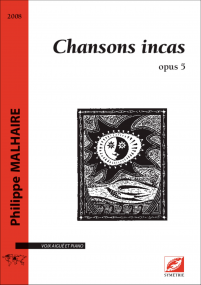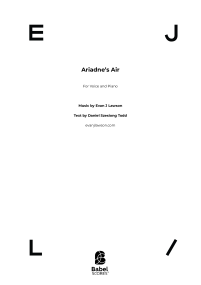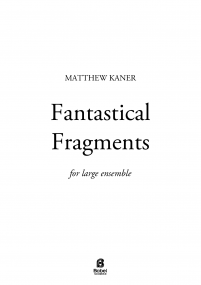Lyrae Orphei Fragmenta
for bass voice (with overtone singing) and piano strings (2022)
8,00 €
Digital version (+0,00 €) instant download
Printed format (+14,80 € printing and shipping). Colissimo7-14 days aprox.
When you buy a score, you can contact the composer right here!
Specifications
Region
Europe
Estimated Duration
6 - 10min
Date
2022
ISMN : 979-0-2325-7665-7
Notes on this piece
Add to a playlist
- Login to create your own lists
Who is Orpheus? A very ancient myth, collected in the Orphic Fragments tell us about an epic wise singer whose chant describes the foundation and cosmogony myths. Therefore he tells about Phanes, male and female at the same time, who appears, shows, expresses « the emergence of a form, of an abyssal reality » (G. Colli, La sapienza greca). Orpheus is definitely linked to Apollon and the Lyre, that sustain the singing of both, stands for this strong relation, witnessed by a large iconography. But Orpheus’ Myth is also strictly connected with Dionysus and all the myths, cults and mysteries that refer to this god. Hence ecstasy and madness, with their wild and mystic power, are fundamental ingredients which merge, in the Orpheus identity, and blends together with his renowned ability to enchant, with the beauty of singing, not only people but animals, plants and even stones. Orpheus itself « is the mythical character invented by Greeks in order to figure the big contradiction, the paradox of polarity and unity of the two gods » (Colli, quoted).
Orpheus is complex character whose identity goes far beyond the case of the beloved Euridice double loss.
His “story” goes on –as Ovidius' Metamorphoses tells us– and we find Orpheus, came out from the Hades,
who turns back to sing his mournful fate and refuses the love of Tracian women who, for this reason, kill him by literally dismember his body. And this dismemberment (“sparagmos”) is just the same destiny that had already occurred to the child Dionysus by Titans.
In this piece I tried to concentrate in three fases the three salient features of Orpheus Myth:
I) Orpheus who sings and enchant with broad melodies that sing the words Phanes, Dionysos, Eurydike.
II) Orpheus dismembered with violent actions in which the voice makes the words sparagmos and again Dionysos resound.
III) After the sparagmos Orpheus’ voice is still there but transformed, bodyless, it is a transmigrating soul that becomes very high and absorbes in itself that one of Euridice, finally found again in the Hades.
This last metamorphosis is possible thanks to the peculiar ability of Victor Andrini to sing vocal harmonics, through the diphonic chant technique: an extraordinary way, for a bass voice, to come out from itself and espress the ambiguity entailed in the figures of Orpheus and Dionysos.
The piano, on its turn, is transfigured as well: I have tried, with a complex and hard work (specially for the pianist!) on the strings to interpret Orpheus’ instrument. The strings of a modern grand piano appears to be quite far from an ancient greek lyre, and sure they are. However it seems that, according to C. Sachs, the lyre player used to give his hands different tasks: the strings were played by the right hand with a struck, while the left hand, by touching some of the strings and so preventing them to resonate, was filtering the resulting sound to get the right harmony. In a similar yet inverse way I let only some strings resonate, by pressing silently the keys and so raising the relative dampers with the left hand, while the right hand plays the strings with a rapid struck. This technique, together with others involving the emission of harmonics, let me estract from the stringboard of the piano a wide range of sonorities that goes from soft resonating harps-like streams to clear harmonics chords, from violent rips to deep rumbling echoes.
Sergio Lanza 2022
Instrumentation
Piano
Bass voice
Bass voice
Score Details
Format - A4 / US Letter
Pages - 16
Pages - 16







